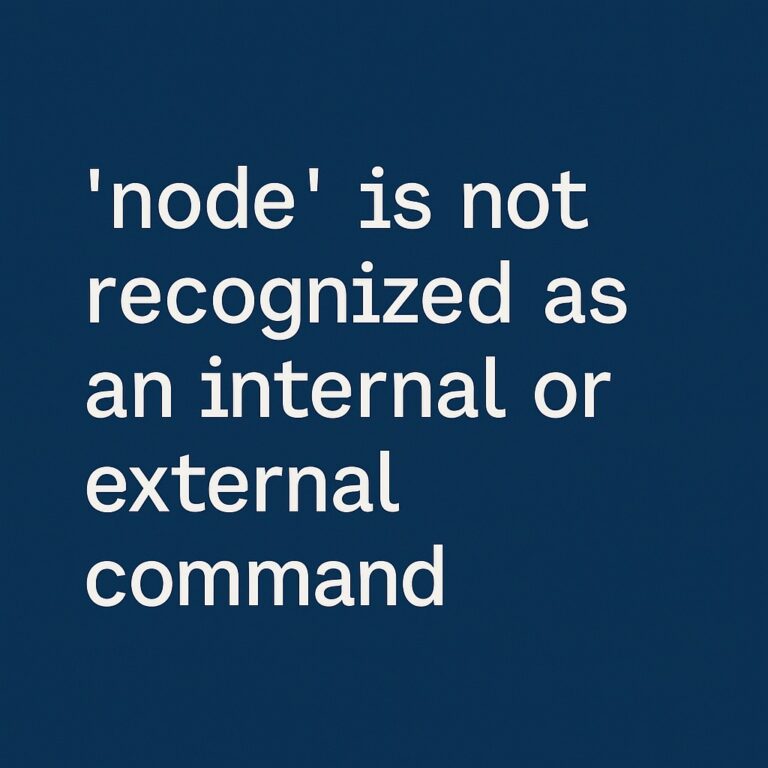
Fix: ‘node’ is not recognized as an internal or external command
Are you seeing the dreaded error:
'node' is not recognized as an internal or external command, operable program or batch file.This issue often occurs when you’re trying to run a Node.js command in your terminal, especially on Windows. Fortunately, the fix is straightforward and doesn’t require advanced technical skills. In this post, you’ll learn why this error happens and exactly how to fix it—step by step.
🤔 Why This Error Happens
This error usually means your system can’t locate the node executable. In technical terms, the Node.js path isn’t added to your system’s Environment Variables (PATH).
This is common for:
- Fresh installations of Node.js
- Manual installations where the system PATH was not updated
- System issues after updates or resets
✅ Step-by-Step Fix for Windows Users
1. Check if Node.js is Installed
Before changing any settings, let’s confirm that Node.js is actually installed.
- Open Command Prompt (press
Win + R, typecmd, then hit Enter). - Type the following command: nginxCopyEdit
node -v
If you still get the same error ('node' is not recognized...), it means Node is either not installed or not linked properly.
2. Install Node.js (if not already installed)
If you’re unsure whether Node.js is installed:
- Go to the official Node.js download page
- Download the LTS version (recommended for most users)
- Run the installer and check the box that says: ✅ Add to PATH (recommended)
This option adds Node and npm to your system’s Environment Variables automatically.
Once installed, close and reopen your terminal. Try running:
node -vYou should now see the Node.js version number (e.g., v18.17.1). If not, proceed to the next step.
3. Manually Add Node.js to PATH
If you already installed Node.js but still get the error, your system probably didn’t add Node to your PATH correctly.
How to Fix It:
- Find the Node.js Installation Path Common locations include:
C:\Program Files\nodejs\orC:\Users\YourUsername\AppData\Roaming\npmInside the folder, you should seenode.exe. - Edit Environment Variables
- Press
Win + Sand type Environment Variables, then select: Edit the system environment variables - In the System Properties window, click Environment Variables.
- Under System Variables, find and select the
Pathvariable, then click Edit. - Click New, then paste the full Node.js path, for example:
C:\Program Files\nodejs\ - Click OK on all open dialogs to save.
- Press
- Restart Your Command Line Close all terminal windows and reopen one. Type:
node -vIf configured properly, the error should now be gone.
🛠 Optional: Add npm to PATH
Node.js usually installs npm (Node Package Manager) by default. But if you’re still getting errors like 'npm' is not recognized, repeat the same steps above and add the following path:
C:\Users\YourUsername\AppData\Roaming\npmAgain, add it to the Path variable using the Environment Variables settings.
🧪 Test Your Setup
Once everything is configured, test it by running:
node -v
npm -vYou should see version numbers like:
v18.17.1
9.6.7If so, congrats—Node.js and npm are working properly!
🔄 Common Mistakes to Avoid
- ❌ Don’t forget to restart your terminal after updating environment variables.
- ❌ Make sure you don’t accidentally overwrite existing PATH entries—only add new lines.
- ❌ Don’t install Node.js in a deeply nested folder or a path with spaces; it can cause recognition issues.
📌 Pro Tip: Use a Terminal Like PowerShell or Git Bash
While Command Prompt works, many developers prefer PowerShell or Git Bash for more robust command-line features. These terminals will also use the system PATH variable.
🧹 Final Thoughts
The 'node' is not recognized as an internal or external command error is one of the most common issues faced by new developers. Luckily, it’s also one of the easiest to fix.
Whether you’re just getting started with JavaScript, React, or any Node-based framework, making sure your Node.js environment is set up correctly is a critical first step.
By following this guide, you’ll be back to coding in no time.
